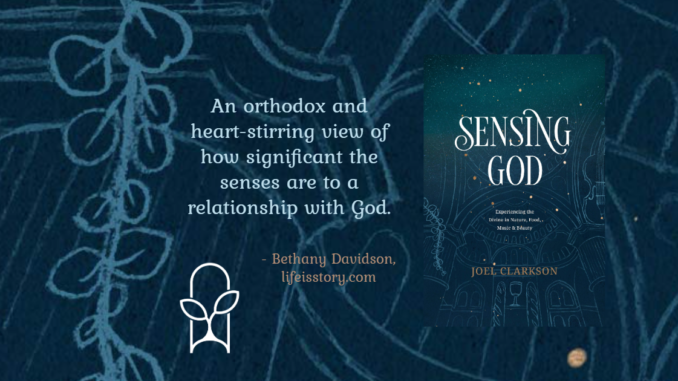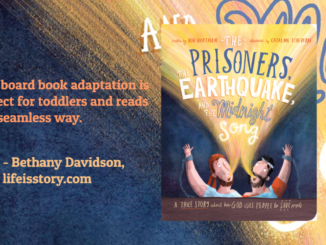
Published by NavPress on January 12, 2021
Genres: Non-Fiction, Christian Life, Theology
Buy on Amazon
Goodreads

So much of our faith is lived out in our heads. We study the Bible, sit through sermons, pray with our eyes closed. All of these are good things. There is a world around us, however, that is crammed with heaven if we have eyes to see it and ears to hear it and hands to touch it. The goodness of God is waiting for us to taste and see. The aroma of Christ surrounds us. In Sensing God, musician and theologian Joel Clarkson points us to a life of faith that is enchanted by the glory of divine craftsmanship, inviting us to practice a faith that is true, good, pure, and altogether lovely.
In Sensing God, author Joel Clarkson encourages his readers to join their intellectual knowledge of God with a deeply felt sense of His presence through beautiful and good earthly things. In the first few chapters, Clarkson lays out his rationale for understanding the role that the senses play in the Christian faith, and even though he does not intend for this to be a comprehensive doctrinal work, he makes a strong case for why Christians should pursue encountering God through their senses, which are good and designed by Him. Throughout the remainder of the book, Clarkson addresses different categories of sensory joys, such as experiencing nature, music, beauty, flavor, and human companionship.
Seeking Beauty
He shares real-life examples from his own experiences, and concludes each chapter with reflection questions to help readers think about how they have experienced God’s grandeur and love through the sense just addressed, and how they can cultivate this more. This book is great for personal use or group discussion, and because Clarkson draws on writings and traditions from a variety of different denominational backgrounds, Christians of different theological convictions and methods of practice can all find something helpful here. I found this book refreshing, and appreciated the lack of tribalism in it. Clarkson does not try to persuade his readers to come around to his exact way of viewing the world, but provides guidance for how everyone can see beauty where they are.
I especially appreciated the chapters on touch and on fasting, because Clarkson handles both of these sensitive subjects unusually well. He acknowledges how “perilous” touch can be, but provides examples from Scripture and Christian history to show how healing, self-giving, and full of dignity meaningful touch can be. Regarding fasting, instead of promoting it merely as asceticism or a method of exerting control over the body, he conceptualizes it as a way to wash the windows of our hearts, reorienting our senses through temporary denial to see things more clearly. Although Clarkson deliberately does not provide step-by-step programs for applying these ideas, he helps his readers refresh their views of the senses in holistic and meaningful ways.
Conclusion
Sensing God: Experiencing the Divine in Nature, Food, Music, and Beauty is a great book for Christians to read, regardless of their denomination or current level of sensitivity to the world around them. People who are already attuned to God’s divine presence in earthly joys can find this book helpful as Clarkson articulates concepts that are difficult to put into words, and readers who tend to discount the significance of the senses, or who regularly feel distracted from them, can benefit from this book’s refreshing and simple challenge to become more aware and invested in the beauty around us. This book provides an orthodox and heart-stirring view of how significant the senses are to a relationship with God, encouraging readers to embrace the full implications and richness of their God-given humanity.



